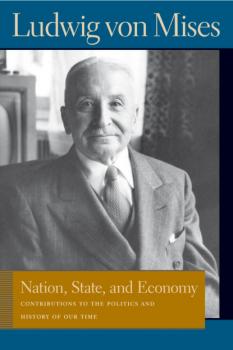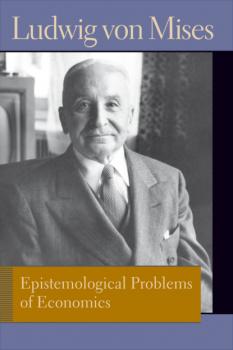Liberty Fund Library of the Works of Ludwig von Mises
Скачать книги из серии Liberty Fund Library of the Works of Ludwig von MisesNation, State, and Economy
Essential to Mises’s concept of a classical liberal economy is the absence of interference by the state. In World War I, Germany and its allies were overpowered by the Allied Powers in population, economic production, and military might, and its defeat was inevitable.Mises believed that Germany should not seek revenge for the peace of Versailles; rather it should adopt liberal ideas and a free-market economy by expanding the international division of labor, which would help all parties. “For us and for humanity,” Mises wrote, “there is only one salvation: return to rationalistic liberalism.”Ludwig von Mises (1881–1973) was the leading spokesman of the Austrian School of economics throughout most of the twentieth century.Bettina Bien Greaves is a former resident scholar and trustee of the Foundation for Economic Education and was a senior staff member at FEE from 1951 to 1999.Please note: This title is available as an ebook for purchase on Amazon, Barnes and Noble, and iTunes.
Omnipotent Government
Published in 1944, during World War II, Omnipotent Government was Mises’s first book written and published after he arrived in the United States. In this volume Mises provides in economic terms an explanation of the international conflicts that caused both world wars. Although written more than half a century ago, Mises’s main theme still stands: government interference in the economy leads to conflicts and wars. According to Mises, the last and best hope for peace is liberalism—the philosophy of liberty, free markets, limited government, and democracy.Ludwig von Mises (1881–1973) was the leading spokesman of the Austrian School of economics throughout most of the twentieth century.Bettina Bien Greaves is a former resident scholar and trustee of the Foundation for Economic Education and was a senior staff member at FEE from 1951 to 1999. Please note: This title is available as an ebook for purchase on Amazon, Barnes and Noble, and iTunes.
Epistemological Problems of Economics
First published in German in 1933 and in English in 1960, Epistemological Problems of Economics presents Ludwig von Mises’s views on the logical and epistemological features of social interpretation as well as his argument that the Austrian theory of value is the core element of a general theory of human behavior that transcends traditional limitations of economic science.This volume is unique among Mises’s works in that it contains a collection of essays in which he contested the theories of intellectuals he respected such as Carl Menger, Eugen von Böhm-Bawerk, and Max Weber. Mises describes how value theory applies to human action at all times and places as opposed to economic theory, which applies only to a human action guided by economic calculation.In a review of Epistemological Problems of Economics that was published in Teacher’s College Record in 1965, F. A. Hayek stated, “If Professor Mises’s Human Action . . . must be regarded as the definitive statement of his views, the distinctive features of his notions of the nature of social science have found their freshest expression in the present series of essays, dating from 1928 to 1933.”Ludwig von Mises (1881–1973) was the leading spokesman of the Austrian School of economics throughout most of the twentieth century.Bettina Bien Greaves is a former resident scholar and trustee of the Foundation for Economic Education and was a senior staff member at FEE from 1951 to 1999.Please note: This title is available as an ebook for purchase on Amazon, Barnes and Noble, and iTunes.
Economic Policy
Economic Policy contains six lectures Ludwig von Mises delivered in 1959 for the Centro de Estudios sobre la Libertad in Argentina. The lectures were posthumously edited by Mises’s wife, Margit, and George Koether, a student and long-time friend of Mises. This volume serves as an excellent introduction to what Mises sees as the simple truths of history in terms of economic principles. In straightforward language, Mises explains topics such as capitalism, socialism, interventionism, inflation, foreign investment, and economic policies and ideas.Ludwig von Mises (1881–1973) was the leading spokesman of the Austrian School of economics throughout most of the twentieth century.Bettina Bien Greaves is a former resident scholar and trustee of the Foundation for Economic Education and was a senior staff member at FEE from 1951 to 1999. Please note: This title is available as an ebook for purchase on Amazon, Barnes and Noble, and iTunes.
Liberalism
This book presents the theoretical and practical arguments for liberalism in the classical tradition as defined by Mises as “the liberal doctrine of the harmony of the rightly understood interests of all members of a free society founded on the principle of private ownership of the means of production.” The foundation of liberalism, Mises says, rests on an understanding and appreciation of private property, social cooperation, the freedom idea, ethics and morality, democracy, and the legitimate role of government. Also in this book, Mises contrasts liberalism with other conceivable systems of social organization such as socialism, communism, and fascism.Ludwig von Mises (1881–1973) was the leading spokesman of the Austrian School of economics throughout most of the twentieth century.Bettina Bien Greaves is a former resident scholar and trustee of the Foundation for Economic Education and was a senior staff member at FEE from 1951 to 1999. Please note: This title is available as an ebook for purchase on Amazon, Barnes and Noble, and iTunes.
Human Action
In Human Action, Mises starts from the ideas set forth in his Theory and History that all actions and decisions are based on human needs, wants, and desires and continues deeper and further to explain how studying this human action is not only a legitimate science (praxeology) but how that science is based on the foundation of free-market economics.Mises presents and discusses all existing economic theories and then proceeds to explain how the only sensible, realistic, and feasible theory of economics is one based on how the needs and desires of human beings dictate trends, affect profits and losses, adjust supply and demand, set prices, and otherwise maintain, regulate, and control economic forces.Ludwig von Mises (1881–1973) was the leading spokesman of the Austrian School of economics throughout most of the twentieth century.Bettina Bien Greaves is a former resident scholar and trustee of the Foundation for Economic Education and was a senior staff member at FEE from 1951 to 1999. Please note: This title is available as an ebook for purchase on Amazon, Barnes and Noble, and iTunes.
Theory and History
Theory and History is primarily a critique of Karl Marx, his materialism, and his prediction of the inevitability of socialism. Marx attributes the creation of tools and machines, as well as the economic structure of society, to undefined “material productive forces.” Mises rejects this materialistic view; he points out that tools and machines are actually created by individuals acting on the basis of non-materialistic ideas.This book discusses the theory of economics, i.e., the study of purposive human action, and history, the record of the past actions of individuals.Ludwig von Mises (1881–1973) was the leading spokesman of the Austrian School of economics throughout most of the twentieth century.Bettina Bien Greaves is a former resident scholar and trustee of the Foundation for Economic Education and was a senior staff member at FEE from 1951 to 1999. Please note: This title is available as an ebook for purchase on Amazon, Barnes and Noble, and iTunes.
The Ultimate Foundation of Economic Science
In this volume, Mises argued that economics is a science because human action is a natural order of life and that it is the actions of humans that determine markets and capital decisions. Since Mises believed these links could be proven scientifically, he concluded that economics, with its basis on that human action, is indeed a science in its own right and not an ideology or a metaphysical doctrine.Ludwig von Mises (1881–1973) was the leading spokesman of the Austrian School of economics throughout most of the twentieth century.Bettina Bien Greaves is a former resident scholar and trustee of the Foundation for Economic Education and was a senior staff member at FEE from 1951 to 1999.Please note: This title is available as an ebook for purchase on Amazon, Barnes and Noble, and iTunes.









